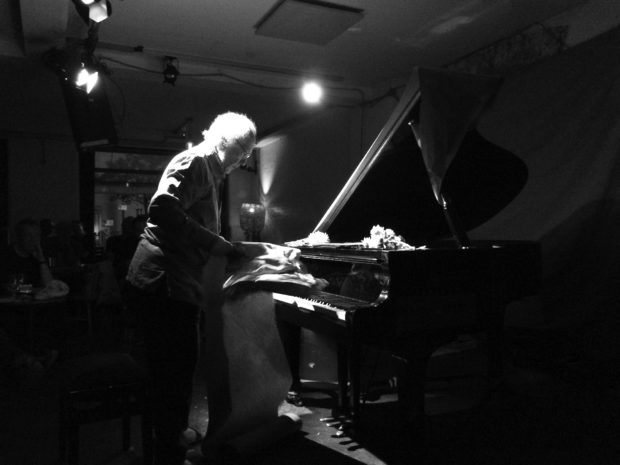You have no items in your cart. Want to get some nice things?
Go shopping
The silence in Café Oto is the silence of a church. On the dozen or so tables, tea lights flicker. We sit very still not daring to take a sip of our drinks for fear we might make a sound. This silence is immersive despite the fact we have all been handed a sheet of paper, which gives us permission to participate by
“buying something
to eat or drink
and then sometime during ……
make
consciously & explicitly
a sound with it.
Thus adding to the music …”
No one seems willing to enact their right to participate given to them by Philip Corner, one of the founding members of the Fluxus group. A tall and imposing 83-year-old, Corner appears under a dim spotlight and walks to the piano. Café Oto doesn’t have a raised stage or sloped floors—it is an intimate room with large windows looking onto a narrow East London street. In a Javanese batik shirt, cotton trousers and sandals, Corner’s white hair and mutton chops are the only evidence of his age. His movements are powerful and focused. He introduces his “collaborator, wife and muse”, Phoebe Neville, who is sheathed in a hand-painted silk tunic and a pair of sparkly rubber toe shoes—the kind where each toe has its own ‘finger’. Her hair is green and her face wears an expression of worship.
Corner announces a “reverence to the piano”. While Phœbe performs the traditional namaste, he bows until his head touches the keys. This is the first note we hear. He then says, “Piano Work, a movement”, and he and Neville turn the instrument around so the keys face the audience. At this moment an alchemy begins to take place: the transformation of one element into another. A piano is not simply a means to make music but a kinetic object, a sculpture that creates sound or allows for silence. We are entering a new kind of space. Neville moves with grace. She practically floats.
In the first sounded piece, ‘Petali Pianissimo’, the performers drop petals onto the keys. Where a petal falls, a note is played. They are conversing silently through the means of flowers and chance, physics and aesthetics. We are reminded of our very physicality, our relation to each other, and how it is so much more than the exchange of data via our mobile devices. And this is why we need this kind of performative work more than ever: It is not only a reminder of the power of art and a community of minds, however fleeting, but it is a corrective to lives in which experience is continuously being subsumed and replaced by mediation. There is no algorithm for the chance falling of petals. Corner’s work is an inoculation against the tyranny of ‘if you liked that, then you might like this’. It is real and human and immediate.
Some Javanese masks come out for a piece called ‘Understanding’ in which Neville and Corner blindly play a small Yamaha keyboard—the only electronic sound of the evening.
“The masks will make sure I don’t know what I am doing,” Corner says. Then adds, “Not that I ever understand what I am doing.”
He touches the keyboard with the nose of his mask, riffing on the first reverence. Neville switches between timbres confusing their dialogue. They are playful, respectful and above all totally alive to each other’s bodies and movement. Neville seems to revel in being the ghost in the machine, switching it on and off while Corner stabs at the keys. Undermining the purpose of an object is pure Dada, pure Surrealist, pure Fluxus. Ceci n’est pas un piano when it is under their command—it is a living sculpture, a means of communication.
It is noticeable that no one is taking photos. There would be no point because no recording of this performance would be able to capture the atmosphere in this room. We are watching a rare thing: an experience that defies mediation. A moment we will remember, or not, but it will add to the sum of our parts whether we like it or not.
When the concert ends, the clapping erupts.
Corner says, “And here’s our encore.”
The audience laughs.
“Why are you all laughing?” He asks, genuinely confused.
We are laughing, I think, because we’ve interpreted his comment to mean that our clapping is the encore. We are finally providing the audience participation asked of us.
Then he surprises us by beginning the real encore: a piece dedicated to his friend and collaborator, the Fluxus artist Ben Patterson who died this past June at the age of 82. One of Patterson’s best-known performances was his 1960 ‘Paper Piece’ in which the audience was asked to make sound with paper.
“In memoriam, Ben,” Corner says before unwinding brown packing paper from a large roll and spreading it over the keys. Neville rips some and lets the pieces fall onto the piano, echoing the earlier petals. The piece gets more frenzied as they wrap the instrument, and the sound gets louder. There is the violence of grief to it by the end. The eveninreag ends with the piano sitting silently in its shroud. This is a sane response to the death of a friend. Forget tweets: this is the way to say “I miss you”. We need to re-find our missing rituals and create new ones for our times.
The next morning I meet Corner and Neville at their hotel. The reception area is the size of a phone booth and the breakfast room is cramped. So we walk along London’s juddering, diesel-filled Essex Road in search of a place to talk. The first one we get to is a greasy spoon called My Favourite Café. It smells of sausages and chips.
“Does it bother you always being referred to as a Fluxus artist?” I ask Corner as we take our seats.
“I told myself many years ago, ‘don’t fight it, it’s hopeless’.” He pauses. “I had this epiphany about it a few years ago. For my whole life I’ve been saying, ‘I don’t want to be reduced to Fluxus’ with everyone saying, ‘Oh, Philip Corner is a Fluxkunstler’. Is everything I am doing now Fluxus?”
His food arrives, “Oh God!” he says. The plate is heaving.
“I don’t want to be reduced,” he goes on. “Basically what I am saying is that I am not only Fluxus or somebody’s narrow idea of what Fluxus is. Instead, Fluxus has expanded to everything that I do! I put that in an expression to an Italian collector who asked me to give him a statement. I said, ‘Now let’s accept everything good and call it all Fluxus.’ He loved it! In fact he uses it as his letterhead.” Corner laughs. “At the concert last night, the ‘Petali Pianissimo’ piece, well you could call that Fluxus,” Corner says. “Certainly bowing to the piano, that’s a Fluxus piece, but sitting down and playing François Couperin, well that’s not a Fluxus piece. That’s just so stupid!”
Corner tells me about a studio visit he had recently with another collector, which seems to sum up the absurdity of our consumer society and its relationship to art—an absurdity he seems to relish. “There was this guy who was supposedly an art collector and he came to my studio. One of the things that I do are these things called ‘Pieces of Reality’. They’re related to the music, obviously, but they’re also a visual thing to do with making things out of natural objects. So anyway, I had these ‘Pieces of Reality’ around and I also had this clear plastic bag with some garbage in it, crumpled paper, a great dried spider, and so on, and it was tacked to the wall.
“This collector says to me, ‘when did you do that?’ and I say, ‘what do you mean, when did I do that? That’s my garbage!’ And he tells me he wants to buy it. I said, ‘I can’t sell you my garbage!’ But he wouldn’t give up. He says, ‘But I really like it; it’s a work of art.’ I say ‘no it’s not; it’s my garbage,’ and he tells me he knows what a work of art is. So finally he bought it.”
Corner widens his eyes, still mystified by this exchange, and goes on: “Then I said, ‘I don’t understand’. He says, ‘what don’t you understand?’ And I say, ‘the art market. I don’t understand the art market.’ ‘What don’t you understand about the art market?’ he asks. ‘I don’t understand why anybody would want to buy my garbage.’”
Corner pauses. “So that’s what I think about it all! The world is crazy and they want to buy my garbage. Hey that’s a good slogan!” He repeats it, “The world is crazy and they want to buy my garbage. That sums up everything.”

About Joanna Pocock
Joanna Pocock graduated with distinction from the Creative Writing MA at Bath Spa University. She is a contributing travel writer for The LA Times, and has had work published in The Nation, Orion, JSTOR Daily, Distinctly Montana, the London Sunday Independent, 3:AM, Mslexia, the Dark Mountain blog and Good Housekeeping, among other publications. In 2017 she was shortlisted for the Barry Lopez Creative Non-fiction Prize and in 2018 she won the Fitzcarraldo Editions Essay Prize. 'Surrender', her book about rewilders, nomads and ecosexuals in the American West, will be published by Fitzcarraldo in 2019. She teaches Creative Writing, both fiction and non-fiction, at Central St Martins in London. Some of her writing can be found at: www.joannapocock.blogspot.co.uk and www.missoulabound.worpress.com




